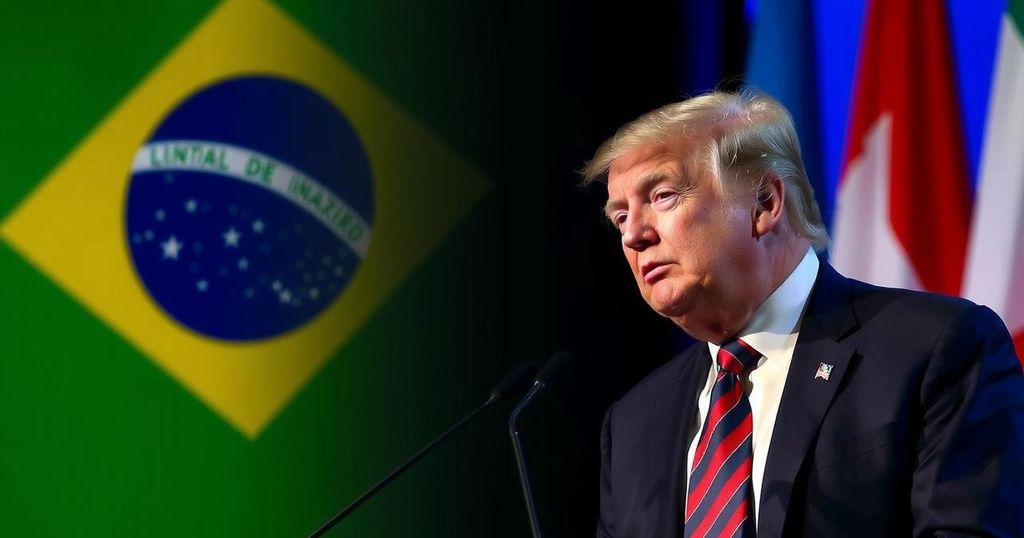Global news
AMERICA, AP, ASIA - PACIFIC ECONOMIC COOPERATION, BIDEN, BIDEN ADMINISTRATION, BRAZIL, DIPLOMACY, FOREIGN POLICY, GROUP OF 20, INTERNATIONAL RELATIONS, NEW YORK POST, NORTH AMERICA, PERU, SOUTH AMERICA, THE NEW YORK POST, TRUMP, UNITED STATES, US PRESIDENTIAL ELECTION, WASHINGTON, WHITE HOUSE, YOON, YOON SUK YEOL
Jamal Walker
0 Comments
Biden’s Diplomatic Summit in South America Amid Trump’s Resurgence
President Joe Biden begins a pivotal six-day visit to Peru and Brazil, engaging in key international summits while global leaders focus on Donald Trump’s return to the White House. The visits aim to solidify partnerships on critical issues despite the evolving political landscape, with particular emphasis on discussions with leaders like Xi Jinping regarding trade and security challenges.
On Thursday, President Joe Biden commences a six-day diplomatic mission to Peru and Brazil, coinciding with significant economic summits that present him with one of his final opportunities to engage with international leaders. His agenda includes participation in the APEC summit, a visit to the Amazon rainforest, and attendance at the G20 summit. However, the focus among world leaders has shifted towards the implications of Donald Trump’s impending return to the White House. Many leaders, including South Korean President Yoon Suk Yeol, have reacted by preparing for potential collaborations with Trump, particularly given his known affinity for golf. Analysts note that Biden’s time as president is in its twilight, with efforts being made to ensure that his discussions in Peru and Brazil yield substantive outcomes on pressing global issues, including climate change and international security. White House national security adviser Jake Sullivan expressed that Biden would maintain his consistent message regarding the importance of alliances for national security. The ongoing dialogues between Biden and Trump illustrate a collaborative atmosphere, despite their party differences, as they discuss various global conflicts and strategic priorities. Trump has plans to nominate established figures for key national security positions, which underscores the anticipated alteration in the U.S. foreign policy landscape. Biden’s meeting with Chinese President Xi Jinping is expected to be of pivotal importance, particularly in light of the competing U.S. and Chinese interests, as well as Trump’s proposals for heightened tariffs on Chinese imports. Biden aims to reinforce American support for Ukraine amidst its conflict with Russia and other regional issues, including the situation in Lebanon and Gaza. His journey to the Amazon rainforest also holds symbolic significance as he reassures global partners of the democratic processes in the U.S. As Biden navigates this critical juncture, he will provide reassurance regarding the continuity of U.S. foreign policy, despite the imminent shift in leadership. The upcoming dialogues will serve to set the stage for future international relations, reinforcing the essential role of diplomacy.
Amid an international landscape characterized by complexities and shifting alliances, President Joe Biden’s visit to Peru and Brazil represents a significant diplomatic endeavor before he exits office. With the backdrop of Donald Trump’s anticipated return as president, global leaders are reassessing their relationships with the United States. The summits Biden is attending aim to strengthen global cooperation on issues such as climate change, security, and infrastructure. This visit also highlights the importance of multilateral dialogue in maintaining international stability, especially in the face of challenges posed by major global powers.
In summary, President Biden’s diplomatic visit to Peru and Brazil marks a critical phase in U.S. foreign relations as he seeks to assert America’s role on the world stage during his concluding days in office. While striving to reinforce alliances and discuss pivotal global issues, Biden also contends with the overshadowing prospects of Donald Trump’s return to presidency. This juxtaposition of leadership serves as a reminder of the dynamism inherent in global politics and the importance of continued diplomacy in navigating such transitions.
Original Source: www.komonews.com




Post Comment